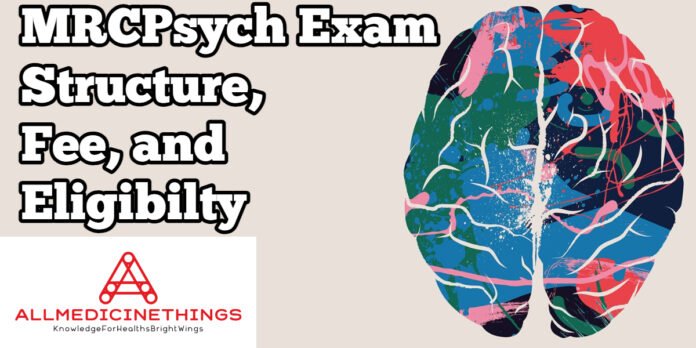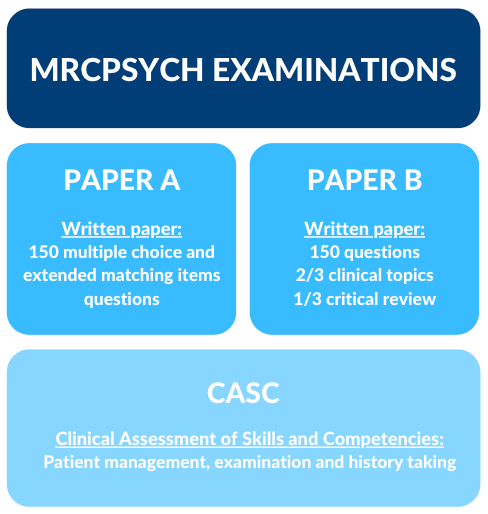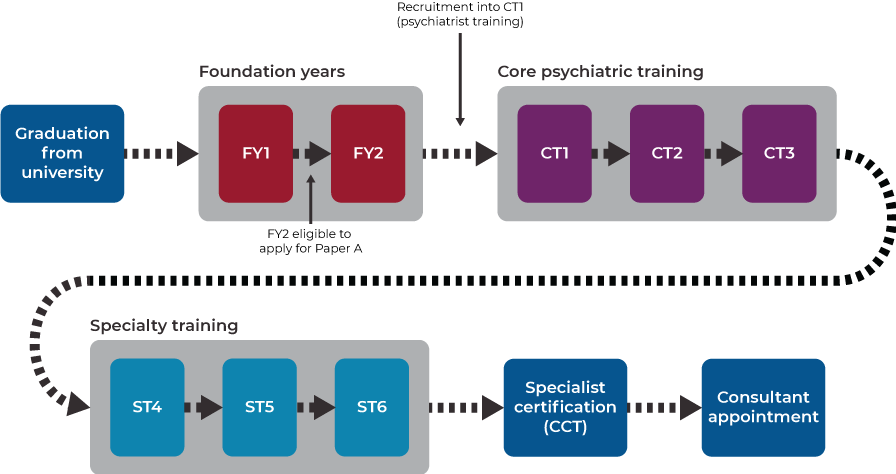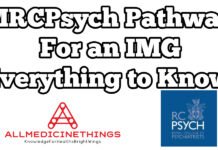The MRCPsych Exam serves as a pivotal assessment in the journey towards achieving membership with the Royal College of Psychiatrists, offering a comprehensive evaluation of a candidate’s theoretical knowledge and understanding of core psychiatric principles. It consists of 2 main parts.
Section A or Part A of the exam is designed to assess the candidate’s grasp of various domains within psychiatry through a diverse range of question formats, primarily consisting of Multiple Choice Questions (MCQs) and Extended Matching Questions (EMQs).
Format of MRCPsych Part A:
The Part A examination typically spans a duration of three hours and comprises a mixture of MCQs and EMQs. These formats are strategically chosen to evaluate the candidate’s ability to recall factual information, apply theoretical knowledge to clinical scenarios, and exercise critical thinking skills in problem-solving contexts.
Multiple Choice Questions (MCQs):
The MCQ section consists of a series of questions with multiple answer choices, where candidates are required to select the most appropriate answer or answers from the provided options. These questions cover a wide array of topics within psychiatry and necessitate a solid understanding of fundamental concepts, clinical guidelines, and evidence-based practices.
Extended Matching Questions (EMQs):
EMQs, on the other hand, present a scenario or statement followed by a list of options. Candidates must match the given options to the scenario or statement, often assessing the application of theoretical knowledge to clinical situations, decision-making skills, and the ability to differentiate between similar concepts.
Topics Covered in MRCPsych Part A:
The Part A examination encompasses a comprehensive range of subject areas, delving into various aspects crucial for a well-rounded psychiatric understanding. The following domains are commonly tested:
1. Psychiatry Sciences:
This section explores the foundational sciences relevant to psychiatry, including neurosciences, neuroanatomy, neurophysiology, neuropharmacology, and neuroimaging. Candidates are expected to demonstrate a comprehensive understanding of brain structure and function, neurotransmitter systems, drug mechanisms, and the interpretation of neuroimaging studies relevant to psychiatric disorders.
2. Critical Appraisal:
Assessment of critical appraisal skills involves evaluating a candidate’s ability to understand and interpret research methodologies, clinical trials, and evidence-based practices in psychiatry. Candidates need to analyze and critique medical literature, applying critical thinking to assess the validity and reliability of research findings.
3. Clinical Psychopathology:
This domain focuses on the understanding of psychiatric disorders based on established diagnostic criteria (e.g., DSM-5, ICD-10), differential diagnosis, and recognizing clinical presentations across different populations. Candidates must showcase proficiency in identifying symptoms, formulating differential diagnoses, and understanding the nuances of psychiatric illnesses.
4. History Taking and Mental State Examination:
Proficiency in history taking and conducting a comprehensive mental state examination is fundamental in psychiatric practice. Candidates are assessed on their interview techniques, ability to elicit relevant information from patients, and conduct a structured mental state examination to formulate accurate diagnoses and treatment plans.
Preparation Strategies for MRCPsych Part A:
Achieving success in the Part A examination requires a systematic and comprehensive approach to studying. Candidates should consider several strategies:
- Study Materials: Utilize recommended textbooks, guidelines, research papers, and online resources provided by the Royal College of Psychiatrists.
- Practice Questions: Engage in solving past papers, MCQs, and EMQs to familiarize oneself with the exam format and improve time management skills.
- Clinical Application: Regularly practice clinical scenarios and case studies to bridge theoretical knowledge with practical application.
- Group Discussions and Courses: Participate in study groups, workshops, or courses to discuss complex topics and learn from peers’ perspectives.
MRCPsych Part B: Objective Structured Clinical Examination (OSCE)
The MRCPsych Part B examination marks a crucial phase in the assessment journey for aspiring psychiatrists, aiming to evaluate clinical competence and practical skills through an Objective Structured Clinical Examination (OSCE). This examination format is meticulously designed to assess a candidate’s ability to apply theoretical knowledge, demonstrate clinical skills, and exercise sound judgment in a series of simulated clinical scenarios.
Format of MRCPsych Part B:
The Part B examination typically consists of a series of OSCE stations, each lasting for a specific duration, where candidates rotate through various stations to encounter different scenarios. The OSCE stations are crafted to simulate real-life clinical situations encountered by psychiatrists, allowing candidates to showcase their clinical assessment, decision-making, and communication skills.
Topics Covered in MRCPsych Part B:
The Part B examination encompasses a comprehensive range of clinical, ethical, and governance-related topics essential for a well-rounded psychiatrist. The following domains are commonly assessed:
1. Clinical Assessment:
OSCE stations evaluating clinical assessment focus on a candidate’s ability to conduct thorough psychiatric interviews, perform mental state examinations, and gather relevant history to formulate accurate diagnoses and management plans.
2. Special Studies:
This domain involves assessing candidates’ knowledge and understanding of specialized areas within psychiatry, such as child and adolescent psychiatry, old age psychiatry, forensic psychiatry, and learning disability psychiatry. OSCE stations may present scenarios related to these subspecialties for evaluation.
3. Clinical Topics:
Scenarios within clinical topics cover a wide spectrum of psychiatric disorders, including mood disorders, psychotic disorders, anxiety disorders, personality disorders, and others. Candidates are assessed on their ability to approach, diagnose, and manage patients presenting with these conditions.
4. Treatment Modalities:
OSCE stations might focus on the application of various treatment modalities in psychiatry, including pharmacotherapy, psychotherapies (such as cognitive-behavioral therapy or psychodynamic therapy), and other biological treatments like electroconvulsive therapy (ECT).
5. Legal and Ethical Issues:
Examination scenarios in this domain aim to evaluate candidates’ understanding of mental health legislation, capacity assessment, consent issues, and ethical dilemmas encountered in psychiatric practice.
6. Clinical Governance and Audit:
Candidates may encounter stations that assess their knowledge and application of clinical governance principles, risk management strategies, and quality improvement methodologies in psychiatric settings.
Preparation Strategies for MRCPsych Exam Part B:
- Practice OSCE Stations: Engage in simulated OSCE scenarios to familiarize yourself with the format and time constraints.
- Clinical Experience: Actively participate in clinical rotations and gain exposure to diverse psychiatric cases to enhance clinical skills.
- Role Play and Communication Skills: Practice effective communication, empathy, and rapport-building with simulated patients or peers to refine interpersonal skills.
- Review Guidelines and Legislation: Familiarize yourself with mental health legislation, ethical guidelines, and clinical governance principles.
Fees for MRCPsych Exam:
Part A:
The Part A examination for MRCPsych carries an approximate fee ranging from £500 to £600. However, it’s essential to note that the fee structure can vary based on the candidate’s location and membership status with the Royal College of Psychiatrists.
Part B:
In contrast, the Part B examination commands a higher fee, typically in the range of £1000 to £1200. Similar to Part A, the exact fee may differ based on location and membership status.
Eligibility Criteria for MRCPsych Exam:
The Membership of the Royal College of Psychiatrists (MRCPsych) examinations, designed to assess the competency and knowledge of aspiring psychiatrists, have specific eligibility criteria that candidates must fulfill to sit for the exams.
1. Medical Degree:
Candidates aiming to undertake the MRCPsych examinations must possess a primary medical qualification recognized by the General Medical Council (GMC) in the UK or an equivalent qualification from a recognized institution abroad. This ensures that candidates have the foundational medical education necessary to pursue specialized training in psychiatry.
2. Foundation Competence:
Completion of Foundation Year 1 (FY1) or its equivalent is a prerequisite for MRCPsych eligibility. FY1 training provides newly qualified doctors with essential skills and competencies across various medical specialties. This foundational training is crucial as it helps in developing a broad understanding of clinical practice before specializing in psychiatry.
3. Psychiatry Experience:
To be eligible for the MRCPsych examinations, candidates typically need to have accrued a minimum of 24 months’ experience in psychiatry. This requirement might vary based on the country’s regulations and the specific training pathway the candidate follows. This experience is vital as it provides exposure to diverse psychiatric cases, patient care, and clinical settings essential for developing competency in the field.
4. Membership:
In many instances, candidates are required to hold membership with the Royal College of Psychiatrists or an equivalent psychiatric college. Membership demonstrates a commitment to the field of psychiatry, continuous professional development, and adherence to the college’s guidelines and standards.
Significance of Eligibility Criteria for Aspirants:
Professional Development:
Fulfilling the eligibility criteria signifies a certain level of professional development and commitment to the field of psychiatry. It ensures that candidates have acquired foundational knowledge and practical experience essential for progressing in their psychiatric career.
Competency Assessment:
The eligibility criteria act as a baseline for assessing a candidate’s competency and readiness to undertake specialized psychiatric training. Meeting these criteria ensures that candidates have the necessary skills and experience to pursue the MRCPsych examinations.
Training Pathways:
Understanding and meeting the eligibility criteria are crucial for navigating different training pathways in psychiatry. Variations in experience requirements or membership prerequisites might exist based on the chosen training route.
Exam Dates for 2023 and 2024:
Part A:
The MRCPsych Part A examination is scheduled multiple times throughout the year to provide candidates with several opportunities to attempt the assessment and progress in their certification journey. For the years 2023 and 2024, the tentative exam dates for Part A are set for March, June, September, and December. These dates are subject to change and should be verified closer to the intended examination period.
Part B:
The Part B examination, crucial for evaluating clinical competence, is also scheduled multiple times in a year. In 2023 and 2024, the tentative exam dates for Part B are scheduled for May and October. Similar to Part A, candidates should regularly check for updates and confirm the examination dates closer to their intended examination window.
Significance of Exam Dates and Fees for Aspirants:
Planning and Preparation:
The availability of multiple examination dates allows candidates to plan their preparation effectively. Aspiring psychiatrists can strategize their study schedules and allocate sufficient time for revision and practice, aligning with their chosen exam date.
Flexibility and Opportunity:
The diverse exam dates offer flexibility, allowing candidates to choose an examination window that aligns with their preparedness. Additionally, the availability of multiple attempts in a year provides candidates with additional opportunities to retake the exam if needed, thereby reducing the pressure of a single examination date.
Financial Considerations:
Understanding the fee structure is crucial for aspirants, as it allows them to plan their finances accordingly. The variation in fees based on location and membership status emphasizes the importance of being aware of the specific fee applicable to individual circumstances.
Application Deadlines for MRCPsych Exam:
Part A:
The application deadline for the MRCPsych Part A exam typically falls around 8 to 10 weeks before the scheduled exam date. This timeframe allows candidates to submit their applications well in advance of the examination date to ensure proper processing and organization of the assessment.
Part B:
In contrast, the application deadline for the MRCPsych Part B examination is considerably earlier, usually around 4 to 6 months before the intended examination date. This extended timeframe is essential due to the comprehensive eligibility review and confirmation process required for Part B.
Significance of Application Deadlines for Aspirants:
Planning and Preparation:
Understanding and adhering to the application deadlines are crucial aspects of planning and preparation for the MRCPsych exam. Aspiring candidates need to mark these deadlines on their calendars to ensure timely submission of their applications.
Avoiding Late Submissions:
Submitting applications within the specified deadlines is imperative to avoid late submissions. Late applications may not be considered, leading to candidates missing their intended examination date and potentially having to wait for the next available window.
Planning for Multiple Attempts:
Understanding the deadlines allows candidates to plan for multiple attempts if needed. Being aware of the application timelines enables candidates to strategically plan their reapplications in case they need to retake the examination.
If you would like to know about the complete pathway for the MRCPsych exam you can read this article.








[…] MRCPsych Exam, Structure, Eligibility and Significance […]